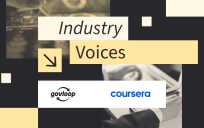Feeling stuck? Not to worry — it’s natural to feel stuck from time to time, whether it’s related to your career or something else in your life. Using coaching questions to coach yourself can help you gain clarity, a fresh perspective, and move forward with energy and focus.

What Is Coaching?
During the coaching process, a professional coach will often use powerful, thought-provoking questions to help you get unstuck. Coaching questions are typically open-ended, and they are designed to help you go deeper and explore your challenges from a different perspective. You can leverage these types of questions for reflection on your own.
Self-Coaching
Self-coaching is a self-reflection process where you ask yourself questions similar to what a professional coach would ask you. Using coaching questions will help you reflect on your current challenges and stimulate new insights that will remove your blockages and spur you to action. Self-coaching is a valuable supplement to professional coaching or an alternative when needed.
Getting Unstuck
As you begin each self-coaching session, take a few moments to prepare yourself for deep self-reflection. Shift yourself into a place of self-compassion and presence. Consider taking a few minutes to meditate, breathe, or simply clear your mind. Pretend you are posing the coaching questions to a good friend. Try writing your answers to the questions in a journal (printed or electronic), or simply on a piece of paper, so you will have your insights available for future reference.
Powerful Coaching Questions
The purpose of asking yourself coaching questions is to help you get to the heart of why you are currently feeling stuck. Coaching questions facilitate self-reflection, which will then inspire you to take action. You may not need to use all of the questions provided below. Choose the ones that resonate the most with you.
Note: The coaching questions can be applied to other scenarios, such as feeling uncomfortable, stressed, or uneasy. Simply replace the word “stuck” in each question with the word that best fits the situation that you want to change.
Step 1: Questions to Help You Get Unstuck
This first set of questions will help you better understand why you are stuck and what is getting in your way.
- What does being stuck mean?
- How does it feel to be stuck?
- What is causing me to feel stuck?
- When did I begin feeling stuck?
- What else is contributing to my feelings of being stuck?
- What are the benefits of being stuck?
- What is the real issue, underneath the surface?
- How would I describe the real issue in one word?
- What will happen if nothing changes?
- What would my future self advise me to do, to get unstuck?
Step 2: Questions to Help You Gain Clarity on Your Goals
Once you have worked through the first set of questions and feel unstuck, this next set of questions will help you get specific about your current goal(s) and what you want to accomplish. Getting specific will help you move forward.
- How would I describe my current goal(s) to my future self?
- What will my life look like after achieving this goal?
- How will I feel after achieving this goal?
- What is holding me back from achieving this goal?
- What is the worst thing that could happen if I do not achieve my goal?
- How likely is that to happen?
- What is the best outcome that could happen if I achieve my goal?
- How likely is that to happen?
- How will I measure my progress toward achieving my goal?
Step 3: Questions to Help You Take Action
You’ve helped yourself become unstuck, and you’ve gained clarity on your goals, so now you’re ready to take action. Reflecting on your next steps will help propel you forward with purpose.
- How will I achieve my goal(s)?
- What are the greatest barriers to achieving my goal(s)?
- What resources do I need in order to achieve my goal(s)?
- Who can support me on this journey?
- What is the easiest step I can take toward achieving my goal(s)?
- What am I committed to doing next?
- When will I take action?
- What can I do to make my action steps more enjoyable?
- What energizes me the most about what’s next?
- How will I celebrate once I have achieved my goal(s)?
Dr. Lauren Forgacs is an organizational development psychologist and applied positive psychologist, with more than six years of service in the federal government and 20 years of private sector experience, including award-winning accomplishments with a top five management consulting firm. She provides expert guidance and customized solutions to federal leaders on organizational development and culture, change management, leadership, teambuilding, employee engagement, and psychological safety. She is an expert on human-centered leadership and recently developed a year-long, cohort-based training program to enhance enterprise-wide leadership skills, organizational effectiveness, and the employee experience. Dr. Forgacs has held several leadership positions, effectively leading and motivating remote, hybrid, and on-site teams. She is also a certified federal leadership coach and a Gallup-certified strengths coach.





Leave a Reply
You must be logged in to post a comment.